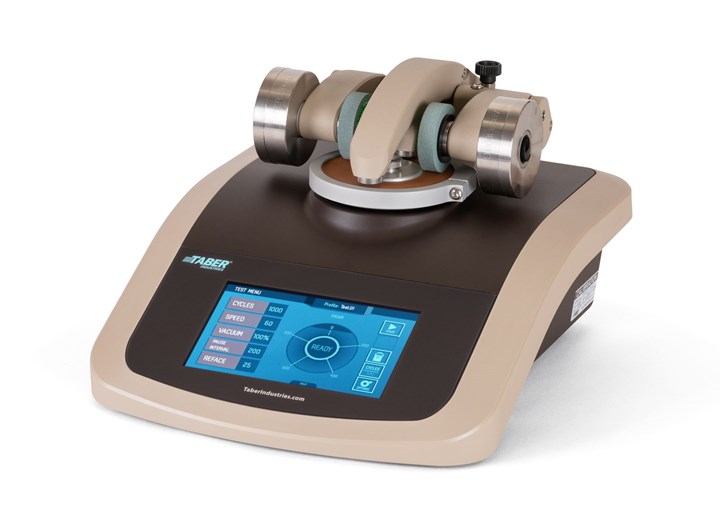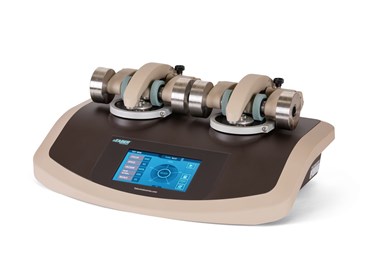Taber Industries launches new models of precision test instrument
Available with a single or dual turntable, the Taber Rotary Platform Abraser is a precision test instrument used to evaluate a material’s resistance to wear.

Model 1700. Source | Taber Industries
Taber Industries’ (North Tonawanda, N.Y., U.S.) updated Taber Rotary Platform Abraser is a precision test instrument used to evaluate resistance to wear for a variety of materials, including plastics, textiles and coated surfaces. The instrument is available in two models — the single turntable Model 1700 or the dual turntable Model 1750.
The updated instrument models have been re-engineered for an aesthetically pleasing, modern appearance and enhanced user experience. An LCD operator touch screen provides an easy-to-use interface with features such as abrader status, visual reference of test complete, cycles/time toggle (complete or remaining), pause interval and more.

Model 1750. Source | Taber Industries
The Model 1700/1750 is designed for long-lasting use and includes a precision-machined, cast aluminum support frame that incorporates alignment pins to ensure exact arm placement in relation to the specimen holder. Compact abraser arm assemblies are individually calibrated and include wave springs to reduce clearance in the bearing assemblies. Push-button quick release wheel mounting hubs include an expanding collet and spring loaded, beveled retaining nut that provides a positive locking force on the hub retaining lip that makes certain the abrading wheels remain securely fastened until disengaged.
A vacuum system removes wear debris during the test and includes a reconfigured air flow that eliminates right angle stops. The vacuum nozzle has been designed with replaceable, screw-in nozzle tips including the nominal 8-mm and optional oversized 11-mm. An improved precision vacuum nozzle height adjustment control eliminates binding when the operator adjusts the gap between the nozzle and specimen surface.
Related Content
-
ASCEND program completion: Transforming the U.K.'s high-rate composites manufacturing capability
GKN Aerospace, McLaren Automotive and U.K. partners chart the final chapter of the 4-year, £39.6 million ASCEND program, which accomplished significant progress in high-rate production, Industry 4.0 and sustainable composites manufacturing.
-
Testing to support composite bolted joint analysis
An overview of ASTM Standard Guide D8509, and its coupon-level mechanical testing of design properties for analyzing composite bolted joints.
-
Plant tour: BeSpline/Addcomp, Sherbrooke, QC, Canada
Composites automation specialist increases access to next-gen technologies, including novel AFP systems and unique 3D parts using adaptive molds.
.jpg;width=70;height=70;mode=crop)





